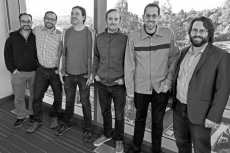New Computational Biosciences Group Aims to Build on Lab Strengths, Break Down Barriers
March 4, 2019

Members of the Computational Biosciences Group include (from left) Héctor García Martin, acting group lead Kris Bouchard, Chris Mungall, Andrew Tritt, Oliver Rübel and Ben Brown. Not pictured are Aydın Buluç, Silvia Crivelli, Hans Johansen, Talita Perciano and Peter Zwart.
A new group in Berkeley Lab’s Computational Research Division (CRD) aims to tap into the lab's expertise in both computing and biosciences, crossing organizational lines to create an integrated team to develop new tools for addressing a range of scientific problems.
"It's no secret that Berkeley Lab is a hotbed of computing and bioscience -- just look at our research facilities like NERSC, JGI, JBEI and ESnet," said computational neuroscientist Kris Bouchard, acting leader of the new Computational Biosciences Group. "Forming the group is a concerted effort to bring together computationally minded biologists and biology-interested computer scientists to create a team that is more than the sum of the parts. We want to mix different skill sets together."
At Shyh Wang Hall, the group will sit in the CRD area within Computing Sciences, with some members matrixed from the Biosciences Area, starting with Bouchard himself, who is in the Biological Systems and Engineering (BSE) Division in the Biosciences Area. Originally trained as a mathematician, Bouchard went on to earn his Ph.D. in neuroscience and joined the lab as a scientist in CRD. He later moved to BSE but continued to collaborate with CRD colleagues on projects related to the NIH BRAIN Initiative.
Peter Nugent, the CRD Deputy for Science Engagement, said one goal for the new group is to get scientists comfortable talking across division lines, or as Bouchard puts it, "breaking down language barriers."
In his new role, Bouchard's dual perspectives give him a good idea of what the challenges are and how to address them.
"Typically, biologists were not trained to think about data as more than a byproduct of their research," Bouchard said. "Due to the complexity of that data, new state-of-the-art methods are needed to fully extract the value and information from those datasets."
On the other hand, machine learning is gaining traction in biosciences research and this is also a strategic focus for Computing Sciences. "We are formulating a plan around machine learning for science; it's hard and takes time and people who are passionate to make it happen," Bouchard said.
Looking ahead, Bouchard sees the group seeking projects both in DOE mission areas and those funded by the National Institutes of Health. In addition to identifying areas for immediate impact, the goal is to hone in on problems with a five- to 10-year timeframe, then identify partners and data providers, as well as funding sources. The many DOE-funded biological research centers at Berkeley Lab are prime targets. One obvious place to look for more collaboration is the University of California, San Francisco, which has been developing partnerships with the lab over the past few years.
At the lab, there are already a number of projects that could be partners: the Exabiome Project, cryo EM, Microbes to Biomes, Neurodata without Borders and others. Bouchard is also part of an inter-lab collaboration with Lawrence Livermore and Argonne national laboratories studying data on traumatic brain injuries. In any of these projects, data will provide the foundation for future advances, Bouchard said.
"This is really about creating a nucleus for formulating bigger approaches to very real problems in biosciences," he added. "We have amazing researchers here at LBL in the computational bioscience space, and we need to increase our visibility from outside the lab, which will hopefully lead to even more partnerships."
About Berkeley Lab
Founded in 1931 on the belief that the biggest scientific challenges are best addressed by teams, Lawrence Berkeley National Laboratory and its scientists have been recognized with 16 Nobel Prizes. Today, Berkeley Lab researchers develop sustainable energy and environmental solutions, create useful new materials, advance the frontiers of computing, and probe the mysteries of life, matter, and the universe. Scientists from around the world rely on the Lab’s facilities for their own discovery science. Berkeley Lab is a multiprogram national laboratory, managed by the University of California for the U.S. Department of Energy’s Office of Science.
DOE’s Office of Science is the single largest supporter of basic research in the physical sciences in the United States, and is working to address some of the most pressing challenges of our time. For more information, please visit energy.gov/science.









